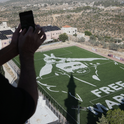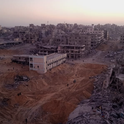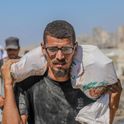A group of Israeli women and men, dressed in black, stood in a line in Tel Aviv last Wednesday evening, 7th May, holding empty pots in their outstretched arms. One woman held a sign that read, in Hebrew and in English: “Starvation is a war crime.”
The protesters had come together to condemn the ongoing blockade of food and humanitarian aid entering Gaza. The siege, which Israel imposed on 2nd March this year, has led to a hunger crisis of “catastrophic” proportions. “This catastrophe did not unfold in the dark; it happened in plain sight,” Kate Phillips-Barrasso, vice-president at the humanitarian organisation Mercy Corps, said in a statement on 12th May. “After more than two months of total blockade, Gaza’s food system has collapsed, humanitarian operations are paralysed, and people are starving.”
She noted that “the entire population of Gaza is now facing emergency levels of hunger with over 244,000 people in catastrophic conditions and 925,000 people on the brink of starvation”.
I participated in the vigil in Tel Aviv, so I had plenty of time to observe the passers-by and listen to their curses. One man began to rage and scream as soon as the silent line formed. “Ashkenazim!” he yelled, a reference to European Jews (which, in Israel, is an accusation of elitism). “Go to Gaza!” At one point, he began throwing pieces of bread into the empty pots.
Some observers shrieked “Busha!” (Hebrew for “Shame!”). One shouted “kapos!” (a word that refers to functionaries in Nazi concentration camps). One woman suggested we exchange ourselves for Israeli hostages held by Hamas. One man spat at us several times. I heard only one observer say, “Kol HaKavod” (“good for you”).
The overwhelming majority of pedestrians ignored us. Diners in the restaurant opposite the vigil continued to eat, drink, chatter and laugh. Occasionally they took out their phones to photograph the protest. At one point, I used my own phone to make a video of the passers-by: cyclists rode on, strollers stared at their phones, deliverymen delivered food. People walked their dogs; they listened to music. They glanced at us; they glanced away.
I wasn’t sure what disturbed me more: those who screamed or spat at us, or those who seemed oblivious. Afterwards, as I walked back to the train station, I asked myself, and not for the first time, how it is possible to be aware of the impact of Israel’s year-and-a-half war on Gaza—the tens of thousands of deaths, the widespread destruction, the famine, the rubble, the tent camps—and yet to look away from a silent protest against starvation.
Many years ago, I worked as a research assistant to the late Stanley Cohen, then director of the Institute of Criminology at the Hebrew University in Jerusalem. At the time he was working on his book, States of Denial: Knowing About Atrocities and Suffering, which was published in 2001 and awarded the British Academy Book Prize in 2002.
States of Denial is a study of “both the personal and political ways in which uncomfortable realities are avoided and evaded”. How is it possible, Cohen asked, that we can “know and not-know?” In his book, he explored many different mechanisms of denial-of-reality, including “pseudostupidity,” (a refusal to believe what you see); “inner emigration” (a retreat into private life to avoid the unbearable outer reality); and denial of the victim—as in, “they started it”.
In political atrocities, “denial of the victim is more ideologically rooted in historically interminable narratives of blaming the other”, Cohen wrote. “‘History’ proves that the people whom you call victims are not really victims; we, whom you condemn, have been the ‘real’ victims; they are, in the ‘ultimate’ sense, the true aggressors; therefore they deserve to be punished; justice is on our side.”
This text, he added, may also draw on ‘just world thinking’. “In a just world, suffering is not random; innocent people do not get punished arbitrarily,” he wrote. “They must have done something. They deserve to suffer because of what they did, must have done, support doing, or will do one day (if we don’t act now).”
Living in Israel, I have often encountered this attitude in fraught conversations with friends. One of them, in an argument about the ethics of bombing civilians while targeting Hamas in Gaza, evoked the spectre and spate of suicide bombings in Israel in the early 2000s, the “Second Intifada”. A bakery in the town where I live sells éclairs that have the Hebrew words “mow them down” written in army-green icing. This is an appeal to the Israeli military to bomb Gaza to ensure quiet for Israel, and no one in the store seems to mind. Inevitably, the question comes: “what about 7th October?”
The Hamas pogrom of 7th October was horrific. Yes, Hamas murdered 1,200 Israelis and citizens of Thailand, Nepal and other countries. Yes, Hamas abducted 251 people into Gaza. Of the 58 that remain in Hamas captivity, 35 are dead and up to 23 are believed to be alive, shackled in tunnels and starved.
Yet none of this justifies deliberately starving the population in Gaza, nor the willingness of Israelis to ignore it. According to the Integrated Food Security Phase Classification, “the entire population [of Gaza], about 2.2m people, is facing high levels of acute food insecurity, with half a million people (one in five) facing starvation”. Starvation of a civilian population as a method of warfare is prohibited by international law. In fact, this is one of the war crimes listed on the ICC arrest warrants for Benjamin Netanyahu and the former Israeli defence minister Yoav Gallant.
Meanwhile, more than 116,000 metric tons of food assistance—enough to feed one million people for up to four months—is stranded at aid corridors, unable to be delivered, according to the World Food Programme. The aid organisation Anera says it has 470 tons of food packed on 823 pallets waiting to enter Gaza, as well as essential supplies like medicines, solar refrigerators, tents and kitchen kits.
The establishment of the Gaza Humanitarian Foundation, a new organisation with US and Israeli backing, has been met with some skepticism. Under its auspices, private US security contractors would distribute a limited quantity of “pre-packaged rations” and hygiene kits at four secure sites in Gaza, in coordination with the Israeli military. International aid groups claim that the initiative violates “fundamental humanitarian principles”. Joseph Belliveau, executive director of MedGlobal, told the Guardian that many people will be reluctant to come to centralised sites overseen by armed personnel, and that others would not be able to reach the sites due to distance or other constraints. Doctors Without Borders noted that the proposed aid is “conditional on forced displacement and vetting of the population.” As part of its new war plan, Israel intends “widespread evacuation” of Gaza’s population into designated “sterile” zones in the southwest of Gaza, and would then “encourage” the emigration of Palestinians from the territory. These Israeli plans “would amount to an abhorrent escalation of its ongoing crimes against humanity,” Human Rights Watch said on 15th May.
Every civilian in Gaza, whether child or adult, has the right to live and thrive, free of the fear of being bombed and starved. And we have a responsibility to speak up for our fellow humans, to witness their suffering and condemn the deliberate withholding of desperately needed food and humanitarian aid, wherever we are. This is true whether you live far away in the UK or nearby in Israel, as I do.
Doctors Without Borders has clearly set out its position: LET. AID. ENTER. GAZA. To the Israelis walking past our empty pots last Wednesday, I say: don’t look away. This is happening now.












